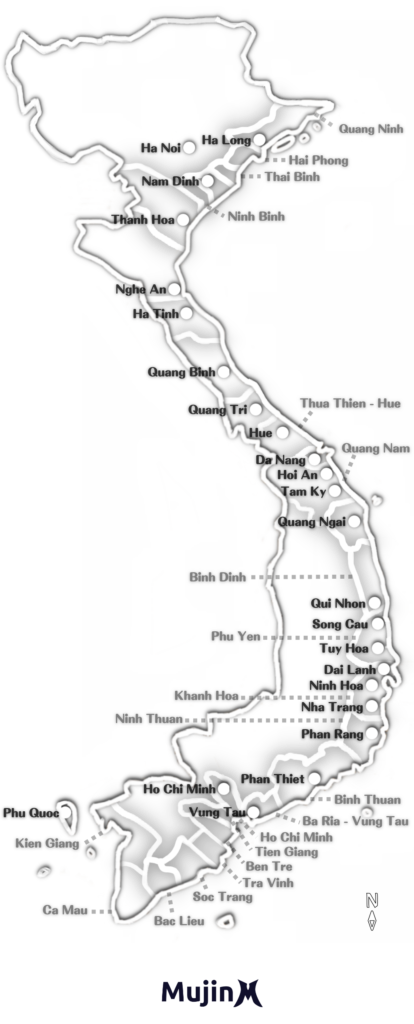
滞在先からスクーターで1分、ラジー(ラギー)町メインサーフビーチの波チェックから朝が始まる。
ここの町は、人と人との距離感が日本に近く、日本人の僕にはとても過ごしやすい。ビーチにはシーフードレストランが数店有るが、呼び込みも気さくな所までに留まり不快さは無い。水1本30,000ドン(約150円)とぼったくり価格だが、今日もここは良い町だ。

周囲に広がる田んぼが気持ちいい。夜は、カエル、虫、小動物による生物の合唱が始まる。これは夜のベストBGMになる。

ビントゥアン省ラジーの町は小さいが、一通りの店舗が揃っている印象。車両のクラクションはとても少なく快適。同じベトナムで、こんなにも差が有るとは驚く。

ベトナムの定番ご飯のコムタム。ご飯とおかずのセットメニュー。コムは千切れたり欠けてしまった米を使っているので安く提供できている。

こだわりのチキンとライス。肉が硬い。味はまぁまぁ。45,000ドン(220円)ちょっと高かった。

ビントゥアン省ラジーの港。海水は黒く、ゴミだらけ。季節風の小波が港内まで届いている。

ラジー漁港で氷の積み込みをしている様子。ここは漁が盛んな漁師町。

漁港の隣で魚を干している。海面が迫ってきている為か人口岩が投入されている。海岸侵食はここでも激しい。

漁師の家。ここに辿り着く為にはバイク1台が通れるくらいの細い道を抜けてこなければならない。

ビントゥアン省ラジー町の市場。今まで経験した市場の雰囲気とは違い落ち着いている為、買物がしやすい環境。ダナンとも全然違うし、他のベトナム地域とも違う。

ラジー市場のローカルレストラン。安くて美味しいご飯が食べられた。

ラジー市場。ベトナムで採れたサメ。

ラジーのサーフポイントサーチは、オフロードが多い。草原やビーチでの虫刺されが気になった程、痒い虫が多い。日本で刺される事が無い小さな蚊は、強い痒みが2週間以上も続く。長袖長ズボンが必須だなと今更思う。

ここのサーフポイントはイマイチな様。どこもサーファーは居ない。いつもオンショアのポイントにサーファーが多い事なんて、世界中無いか。

ビントゥアンと言えばドラゴンフルーツ。ドラゴンフルーツ畑があちらこちらに広大に広がる。安くて味も美味しい。

ここのポイントもイマイチ風が悪い。夏のラジーは、朝から季節風が吹く。風向きは春の湘南と同じ南西寄り。

ここもオンショアでダメ。

ベトナムの海岸には、どこでも漁師のボートが置いてある。ベトナムらしい風景。

今日もラジー正面ポイントが最も風が合っている。南西風がサイドオフショアになり、かつ回り込んだ南西うねりも拾ってくれる。

ラジー正面ポイント。常に吹く季節風の影響で、左へのカレントがいつも強い。
(2019年8月サーフトリップ記録 ベトナム ビントゥアン省ラジー )





